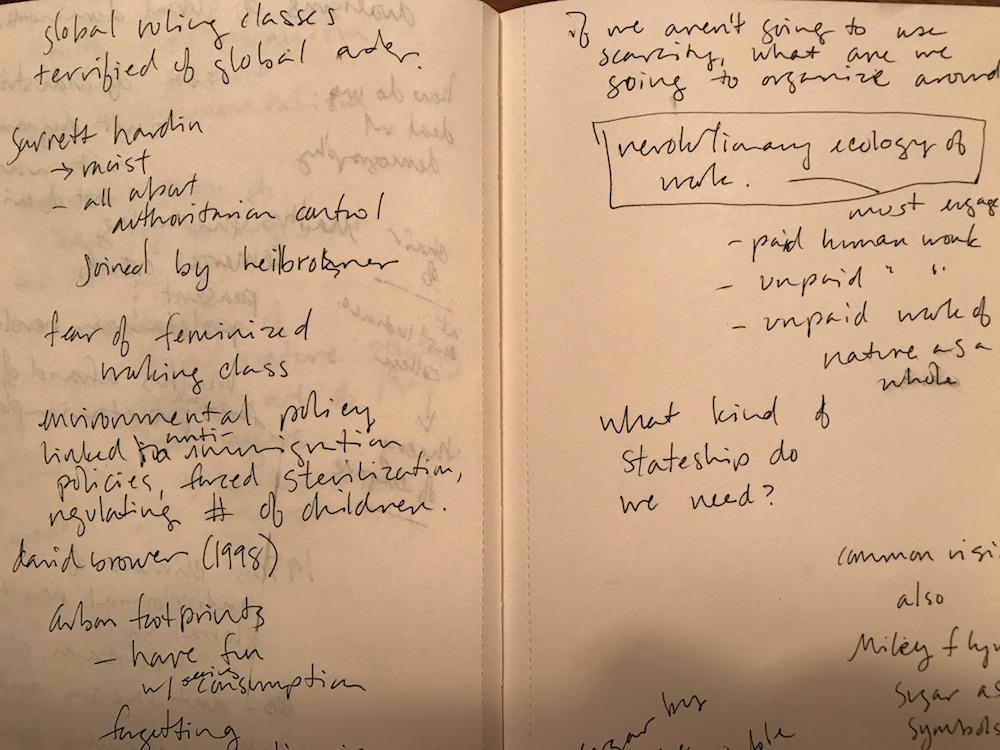This was the title of a talk I gave at the Third Annual World Ecology Research Network Symposium. It was an honor to present some new thinking at this symposium, directed by Jason W. Moore. I am so excited to put my work and the work of many other multi-species artists in dialog with Revolutionary Ecologies. Specifically, I spoke about the Guerrilla Grafters, permaculture, the work of Elaine Gan, Jordan Yerman, and Ellie Iron’s & Christopher Kennedy’s Weedy Resistance. Abstract below. I am prompted to think more deeply and broadly about the role of the arts in Revolutionary Ecologies. I am particularly inspired by Randall Szott’s thinking about how social practice might overlap, become, or demand soil practice as a way towards resiliency, or flourishing here….
The image is of my notes from Moore’s plenary, essential thinking and essential history for understanding how life beyond-the-human is caught up in capitalism, and how we might conspire to undo it.

Abstract:
Cybernetic capitalism, the nature/culture binary, and an ethics of difference
The principles of cybernetics, the “entire field of communication and control” as Norbert Weiner declared it, may have taken root in the entirety of our networked society. The French anarchist group Tiqqun argues that capitalism began to employ the ‘cybernetic hypothesis’ in the 1970s as a way to both sustain itself and expand its violent ethos that includes the dissolution of difference. But whole systems design strategies, emerging from the second wave of cybernetics, complicate the ease with with which cybernetic capitalism totalizes and thus disregards real life. By collapsing the dualism between nature and culture, and by routing outputs back into inputs (feedback loops), multispecies coalitions including artists, gardeners, activists and neighbors generate sites of abundance that undo regimes of scarcity and property. These ideas will be developed through a series of contemporary art and activist projects that employ the above relational and cultivation strategies, concluding with deeper questions around totalizing views of control, conceptions of wilderness, and the implications of seeing waste as nutrient.
Cybernetic Capitalism, the Nature/Culture Binary, an Ethics of Difference
This was the title of a talk I gave at the Third Annual World Ecology Research Network Symposium. It was an honor to present some new thinking at this symposium, directed by Jason W. Moore. I am so excited to put my work and the work of many other multi-species artists in dialog with Revolutionary Ecologies. Specifically, I spoke about the Guerrilla Grafters, permaculture, the work of Elaine Gan, Jordan Yerman, and Ellie Iron’s & Christopher Kennedy’s Weedy Resistance. Abstract below. I am prompted to think more deeply and broadly about the role of the arts in Revolutionary Ecologies. I am particularly inspired by Randall Szott’s thinking about how social practice might overlap, become, or demand soil practice as a way towards resiliency, or flourishing here….
The image is of my notes from Moore’s plenary, essential thinking and essential history for understanding how life beyond-the-human is caught up in capitalism, and how we might conspire to undo it.
Abstract:
Cybernetic capitalism, the nature/culture binary, and an ethics of difference
The principles of cybernetics, the “entire field of communication and control” as Norbert Weiner declared it, may have taken root in the entirety of our networked society. The French anarchist group Tiqqun argues that capitalism began to employ the ‘cybernetic hypothesis’ in the 1970s as a way to both sustain itself and expand its violent ethos that includes the dissolution of difference. But whole systems design strategies, emerging from the second wave of cybernetics, complicate the ease with with which cybernetic capitalism totalizes and thus disregards real life. By collapsing the dualism between nature and culture, and by routing outputs back into inputs (feedback loops), multispecies coalitions including artists, gardeners, activists and neighbors generate sites of abundance that undo regimes of scarcity and property. These ideas will be developed through a series of contemporary art and activist projects that employ the above relational and cultivation strategies, concluding with deeper questions around totalizing views of control, conceptions of wilderness, and the implications of seeing waste as nutrient.